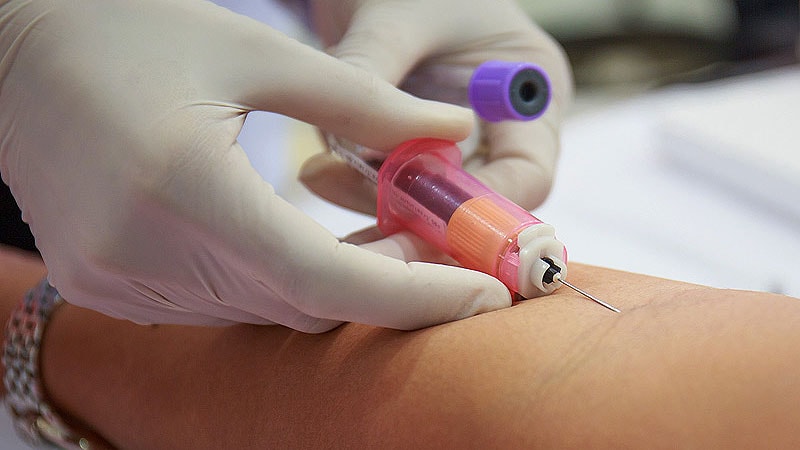Core Concepts
Liquid biopsy assay using ctDNA methylation markers accurately predicts CRC recurrence risk.
Abstract
Liquid Biopsy Assay for CRC Recurrence Prediction
Liquid biopsy assay with 6 ctDNA methylation markers predicts CRC relapse risk.
Positive ctDNA methylation post-surgery increases relapse likelihood by 17.5 times.
ctDNA-positive patients have shorter recurrence-free survival post-chemotherapy.
Importance of ctDNA Methylation
ctDNA methylation crucial for recurrence-free survival prediction in CRC.
ColonAiQ test simplifies ctDNA methylation detection without tumor profiling.
Study Findings
Study evaluated 299 CRC patients with pre and postoperative samples.
Positive ctDNA status at post-op month 1 linked to higher relapse risk.
Integration of CEA testing with ctDNA improves prognostic accuracy.
ctDNA methylation analysis detects CRC recurrence earlier than radiology.
Sustained ctDNA positivity leads to significantly shorter recurrence-free survival.
Practical Implications
Simple assay workflow and blood sample collection enhance clinical feasibility.
Editorial suggests validating ColonAiQ's clinical importance in trials for wider use.
Liquid Biopsy Assay Can Predict CRC Recurrence Early
Stats
Patients ctDNA methylation-positive post-surgery 17.5x more likely to relapse.
Positive ctDNA status at post-op month 1 linked to higher relapse risk (HR 17.5).
Patients with positive CEA and ctDNA tests had worse prognoses (HR 19.0).
ctDNA analysis detects CRC recurrence 3.3 months earlier than radiology.
ctDNA-positive patients have significantly shorter recurrence-free survival (HR 13.8).
Patients with sustained ctDNA positivity have higher relapse risk (HR 68.8).
Quotes
"ctDNA methylation was the most significant prognostic factor for recurrence-free survival." - Shaobo Mo
"ctDNA is a powerful tool in oncology that is here to stay." - Van Morris
Key Insights Distilled From
by Nancy A. Mel... at www.medscape.com 04-27-2023
https://www.medscape.com/viewarticle/991311
Deeper Inquiries
How can liquid biopsy assays like ColonAiQ impact the future of CRC treatment?
Liquid biopsy assays like ColonAiQ can have a significant impact on the future of colorectal cancer (CRC) treatment by providing a non-invasive and efficient method for monitoring disease progression, predicting recurrence, and guiding treatment decisions. The ability of ColonAiQ to detect circulating tumor DNA (ctDNA) methylation markers with high accuracy allows for early identification of patients at risk for relapse after surgery and adjuvant chemotherapy. This early detection can lead to timely interventions, potentially improving patient outcomes and survival rates. Additionally, the simplicity and cost-effectiveness of the assay workflow make it a practical tool for routine clinical use, enhancing its accessibility and feasibility in various healthcare settings.
What are the potential limitations or drawbacks of relying on ctDNA testing for treatment decisions?
While ctDNA testing, such as ColonAiQ, offers valuable insights into CRC recurrence risk and treatment response, there are potential limitations and drawbacks to consider when relying on this technology for treatment decisions. One limitation is the need for further validation and standardization of ctDNA assays to ensure their accuracy and reliability across different patient populations and healthcare settings. Additionally, the interpretation of ctDNA results may require expertise and careful consideration, as false positives or negatives could impact treatment decisions and patient outcomes. Furthermore, the cost of ctDNA testing and the availability of resources for widespread implementation may pose challenges in certain healthcare systems, potentially limiting access to this technology for all patients who could benefit from it.
How might the widespread adoption of liquid biopsy assays change the landscape of cancer care in the coming years?
The widespread adoption of liquid biopsy assays, including ColonAiQ, has the potential to revolutionize the landscape of cancer care in the coming years by offering personalized and minimally invasive approaches to disease monitoring, treatment selection, and response assessment. These assays can enable early detection of cancer recurrence, identification of treatment-resistant mutations, and real-time monitoring of treatment efficacy, allowing for timely adjustments in therapy and improved patient outcomes. Moreover, the non-invasive nature of liquid biopsies can reduce the need for invasive tissue biopsies, leading to less patient discomfort, lower healthcare costs, and more frequent monitoring of disease progression. As liquid biopsy technology continues to advance and become more widely available, it is likely to become an integral part of routine cancer care, facilitating precision medicine approaches and enhancing the overall quality of patient care in oncology.
0
